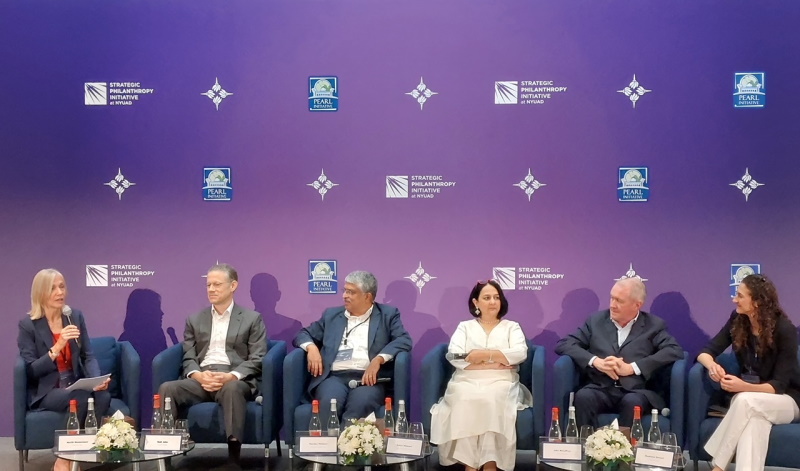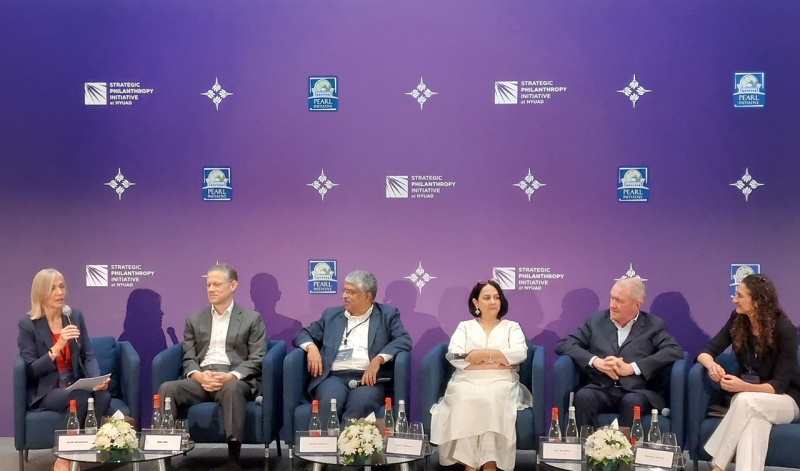
NYUAD and Pearl Initiative Host Prominent Philanthropists to Drive the Conversation on Strategic Giving in the Gulf Region and South Asia
- Philanthropy in the Gulf region is estimated at USD 210 billion annually with further growth potential.
- Over the next 20 years in Asia, USD 26 trillion of wealth is expected to be passed to the next generation underscoring the need for enhanced governance and strategic giving to maximize impact.
NYU Abu Dhabi’s (NYUAD) Strategic Philanthropy Initiative (SPI), the first academic and community-based platform to shape a dynamic and strategic practice of philanthropy within the UAE and the wider region, in partnership with the Pearl Initiative, a business-led, non-profit organization promoting corporate governance in the Gulf region, hosted an interactive discussion focused on trends in regional philanthropy. The talk highlighted the opportunity to see philanthropic capital as risk capital to pave the way to achieving sustainable and scalable social impact, further strengthening and promoting strategic giving in the Gulf region and South Asia.
The session featured prominent philanthropists from the Gulf region and South Asia including HE Huda I. Alkhamis-Kanoo, Founder of the Abu Dhabi Music & Arts Foundation and Founder & Artistic Director of Abu Dhabi Festival; Badr Jafar, CEO of Crescent Enterprises and Founder of the Pearl Initiative; Mariët Westermann, Vice Chancellor of NYU Abu Dhabi; Nandan Nilekani, Co-founder and Chairman of Infosys; Rohini Nilekani, Chairperson of Rohini Nilekani Philanthropies; John McCaffrey, President of the Galileo Foundation and Shoshana Stewart, President of Turquoise Mountain. The event highlighted the growing role of philanthropy in the Gulf region and South Asia and collaboration as a key component of effective giving.

Welcoming the opportunity to discuss the future of strategic philanthropy in the region, HE Huda I. Alkhamis-Kanoo said: “It is a pleasure to be amongst inspiring philanthropists who are driving sustainable social impact. The discussion reaffirmed my belief in the important role philanthropy plays in supporting a thriving arts and culture industry, inspiring artists to innovate, generations to create, and communities to unite and prosper.”
According to a recent report by the Centre for Strategic Philanthropy at the University of Cambridge, philanthropic giving in the Gulf region is estimated to be in the range of USD 210 billion annually. Nandan Nilekani commented: “Philanthropic organizations and individuals across the world are bringing about extraordinary impact. Rather than working in a silo, we can collectively benefit and learn from each other by sharing expertise, experiences, and lessons learned to strengthen institutions, leadership and society as a whole.”
Echoing the call for collaborative practices in the philanthropic space, Rohini Nilekani said: “It is critical to reduce the friction to collaborate, between philanthropists themselves, and also between the markets, the state and the philanthropic community. If we want philanthropy to have greater impact at scale, we must learn to distribute the ability to solve, so that communities use their own context to address their issues.”
Badr Jafar, who is also the Patron of the Strategic Philanthropy Initiative at NYUAD, spoke about the importance of empowering the next generation of strategic philanthropists, stating: “Both the Gulf region and South Asia have cultures that are deeply rooted in humility and discretion in giving, which often overrides the importance of speaking of one’s philanthropies more openly. With Asia set to face the largest intergenerational wealth transfer over the next 20 years with USD 26 trillion expected to be passed to the next generation, there’ll be no shortage of philanthropic capital and new philanthropists eager to make a social impact. This, in turn, stresses the importance of more targeted philanthropy and the need for enhanced governance structures to maximize the impact of giving in the region.”
Mariët Westermann, who moderated the panel, said: “With many stories of success from the corporate as well as the non-profit world, the panelists gave valuable insights on the need to view philanthropic capital as risk capital, and indicated how the private sector can be leveraged for solutions that produce social good. Philanthropy that integrates diverse stakeholders in many thriving industries, including the arts and culture, is of enormous benefit to economies and societies at large. It was an honor to host a panel of such esteemed philanthropic leaders from the business and NGO sectors. We look forward to organizing similar discussions to help magnify the impact of philanthropic capital from within the region, in line with the mission of the Strategic Philanthropy Initiative at NYUAD.”
Following the event, held at The NYUAD Institute, there was a curated tour of The NYUAD Art Gallery’s current exhibition, Khaleej Modern: Pioneers and Collectives in the Arabian Peninsula, which surveys the emergence of modern art in the Arabian Gulf.
NYUAD’s SPI is the first academic and community-based platform to shape a dynamic and strategic practice of philanthropy within the UAE and across the Gulf and broader Middle East and North Africa (MENA) region. The SPI was established through a four-year framework agreement between NYUAD and Emirati businessman and social entrepreneur Badr Jafar, who will support this initiative throughout its formative years.
The Pearl Initiative is the leading not-profit organisation responsible for spearheading programmes across the Gulf that deliver data-driven insights and amplifies the importance of corporate governance principles as a business imperative to support corporations, family firms, micro, small and medium-sized enterprises (MSMEs), and philanthropic organisations in applying governance standards, including through diversity and inclusion, anti-corruption practices, and environment, social and governance (ESG) reporting.



























